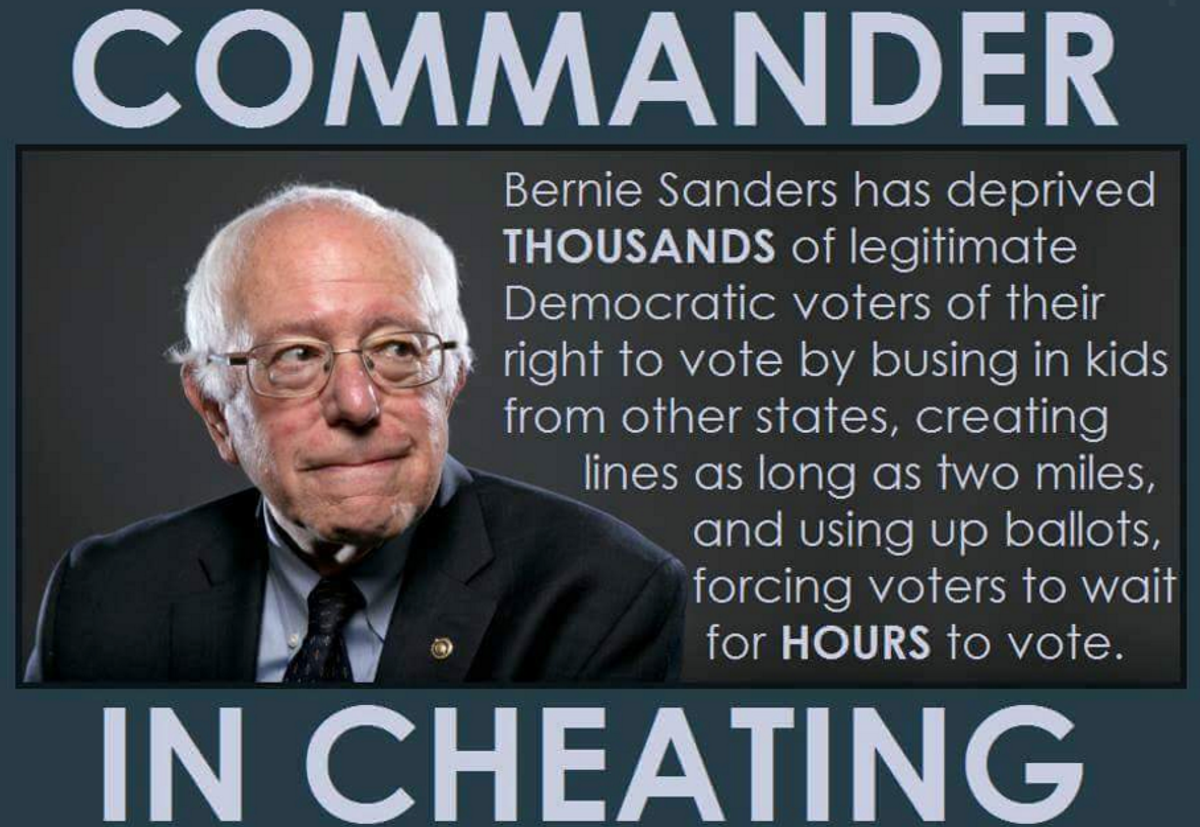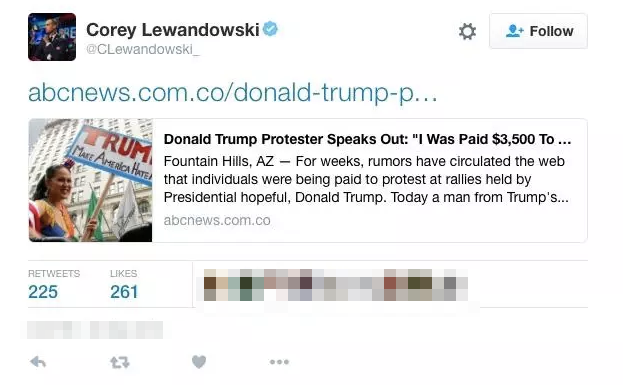The Sanders campaign announced plans to arrange transportation for Iowan college students to attend their hometown caucuses.
No evidence documents that the Sanders campaign arranged for out-of-state voters to disrupt primaries or caucuses, or to vote illegally.
As Democratic presidential candidate Bernie Sanders racked up impressive late-March 2016 primary and caucus wins across three states (Alaska, Hawaii, and Washington) in one day, his success prompted renewed interest in an older social media rumor claiming that his support had been bolstered through the tactic of busing large numbers of youngsters' in from out of state to "crowd out legitimate voters."
News reporting on March 2016 primaries and caucuses often focused on massive voter turnout in some states, a phenomenon that led to hours-long lines at the polls and ballot shortages. But rumors claiming the Sanders campaign deliberately bused disruptive youngsters to those events didn't originate with candidate's March 2016 wins — two months earlier, Sanders had become visibly annoyed when a question on that subject was posed to him by editor Al Hunt at a Bloomberg Politics breakfast in Des Moines:
In the heated exchange captured in the above above, Hunt appeared to suppress amusement as he posed a question that included reference to "out-of-state young people" showing up at caucuses:
The Clinton people say that they are, in places like Ames and Iowa City, that they are very worried that a number of out-of-state young people may try to show up to the caucus and they're going to make a major effort to make sure that that's not the case.
Hunt didn't include any qualification for the question, such as evidence uncovered by Bloomberg Politics (or anyone else) that the Sanders campaign had actually engaged in any disruptive busing efforts. Other reporting from that news outlet suggested the same claim had been levied by Clinton supporters against Barack Obama during the 2008 presidential contest. Evidence of the same accusation being lobbed at Obama remains on a few sites, including Politico, where a December 2007 blog item quotes a Clinton campaign spokesman as saying:
There's a big difference here. We are not systematically trying to manipulate the Iowa caucuses with out of state people. We don't have literature recruiting out of state college students. We didn't bus in folks from out of state to the [Jefferson-Jackson dinner]. We didn't bring in out of state activists to the Heartland Forum.
A visibly agitated Sanders replied to Hunt's suggestion that his campaign was engaging in the same sort of manipulation that the Obama campaign had been accused of by Clintonites back in 2008:
Really? Is that what they're saying? You know I am, this is ... You talk about negative stuff ...
Really? Based on what do they say that? Based on David Brock's long history of honest and integrity? The man who tried to destroy Anita Hill? Is that where this is coming from?
Everyone of you know, you know it, that every day you're being flooded by all this negative stuff from Sec. Clinton's super PAC. I haven't heard of that. I don't want my integrity and honesty to be impugned. I have no idea who says this, that is a lie. An absolute lie.
We will win or lose, we do it honestly, and I really dislike people suggesting we're going to bring in students from out of state who are going to perjure themselves, and say they are from Iowa? That's, talk about negative stuff, this is what ... Again, I don't think this is the Secretary ... but you bring people like David Brock ... into your campaign ... if this is the kinda stuff that they're planting, that's negative stuff.
Sanders referenced David Brock, whose role in the Clinton's 2016 campaign was described thusly by the Los Angeles Times:
Brock guides a network of pro-Clinton "super PACs," mega-donors and opposition researchers that operates outside the confines of federal restrictions on campaign spending. At the center is Media Matters, his decade-old nonprofit group that meticulously monitors and counters conservative media, political attacks on liberal politicians and — more recently — unflattering stories about Clinton in the mainstream press.
Sanders also referenced Brock's admitted involvement in the deliberate smearing of Anita Hill, who testified during Senate hearings for Supreme Court nominee Clarence Thomas in 1991 that Thomas had sexually harassed her while he was her supervisor at the Department of Education and the EEOC:
The author of a best-selling book that attacked the credibility of Anita F. Hill has disavowed its premise, and now says that he lied in print to protect the reputation of Justice Clarence Thomas.
David Brock, the author of the book, "The Real Anita Hill," has also suggested [in a magazine article] that Justice Thomas used an intermediary to provide Mr. Brock with damaging information about a woman who had come forward to provide support for Ms. Hill's accusations of harassment by Justice Thomas ... Brock reported that he then used the information to force the woman to retract her statements about Justice Thomas.
The article, in the August issue of Talk magazine, is excerpted from Mr. Brock's new book, "Blinded by the Right: The Conscience of an Ex Conservative." Describing an article he wrote for The American Spectator, a conservative magazine, in 1992, which became the basis for his book on Ms. Hill, he said he did everything he could to "ruin Hill's credibility," using "virtually every derogatory and often contradictory allegation I had collected on Hill into the vituperative mix." ... Mr. Brock wrote that he used the information to intimidate her into recanting her account, threatening that he would "blacken her name, just as I had done to every other woman who had impugned Thomas's reputation."
A pair of items published in the New York Times in late January 2016 possibly fed the "disruptive busing" rumors. On 24 January 2016 that newspaper reported that the "Bernie Sanders youth brigade" was on the move, and the campaign was planning to transport Iowa college students back to their hometowns so the youngsters could participate in the state's caucuses:
With the Iowa caucuses just over a week away, the Bernie Sanders youth brigade is on the move.
Seven hundred college-age volunteers from across the Midwest and as far away as California are streaming into Iowa to help get the vote out. Organizers on Iowa campuses are reserving rooms to turn into phone bank centers, distributing campaign-provided toe warmers to the foot soldiers and playing Mr. Sanders’s spoken-word version of “This Land Is Your Land” to motivate them.
Ahead of Feb. 1, the day Iowa voters finally have their say, the Sanders campaign is activating "Go Home for Bernie," a plan to dispatch a fleet of rental cars, vans and buses, if necessary, to carry students who are from Iowa back to their hometowns, where they will have maximum impact on the caucuses.
A few days later, that same newspaper reported some uncertainty about how many of Sanders' Iowa supporters were actually registered to vote:
It's common to talk about the turnout challenge facing Donald Trump, who clearly fares well among those who don't vote regularly. But the candidate with the biggest turnout challenge in this cycle is probably Bernie Sanders.
Mr. Sanders appears to be extraordinarily dependent on turnout from infrequent voters, even more than Democrats have recently been in general elections, and maybe more than Barack Obama in the 2008 Iowa caucuses — mainly because his support is so strong among the young.
The scale of Mr. Sanders’s turnout challenge is unusually large. Compared with the supporters of Hillary Clinton, his are far less likely to report that they intend to vote; they have less history of voting; and they come from demographic categories who turn out in low numbers. This all adds considerable uncertainty to the pre-election polls, which always struggle to determine who is or is not likely to vote.
There are even questions about how many of Mr. Sanders’s supporters are actually registered to vote. He has not yet led in an Iowa poll that was conducted using data from voter registration files, the technique preferred by most campaigns but only occasionally used by media pollsters. All but one of the surveys using random digit dialing — a kind of poll that contacts all types of adults, including those who are unregistered — have shown a Sanders lead in the state.
However, both pieces described the need for Sanders to ensure his Iowa supporters could participate in their hometown caucuses, not a plot to bring students in from outside Iowa to infiltrate the state caucuses and other politics events. We found no reports about the Iowa caucuses that addressed unregistered, out-of-state agitators having taken part in them, nor were we able to locate reports of any similar voter chicanery emerging in any states in which caucuses or primaries had thus far been conducted.
Moreover, we found no such reports of organized travel among Sanders supporters on social media, despite the propensity of young people to catalog their exploits on Twitter, Facebook, Instagram, and the like. The apparently baseless claim wasn't even unique to presidential campaigning when Hunt presented it to an annoyed Sanders on 28 January 2016 — prior to that, similar rumors had circulated about spates of Black Lives Matter protests across the United States in 2014 and 2015 (again, with no substantive evidence any such collusion was underway).
In March 2016, the same tale was repurposed as a narrative thread in the tapestry of rumors regarding protests at Donald Trump rallies. So rife was the belief that paid protesters were disrupting Trump rallies that Trump campaign manager Corey Lewandowski tweeted (and then deleted) a link to a fake news story purporting to support the rumor:
Despite the enduring popularity of the rumor, we've never been able to find evidence (of which there should be a few social media traces) that Sanders (or anyone else) engaged students (or anyone else) to travel to sites and disrupt or fraudulently participate in rallies, caucuses, or primaries.


